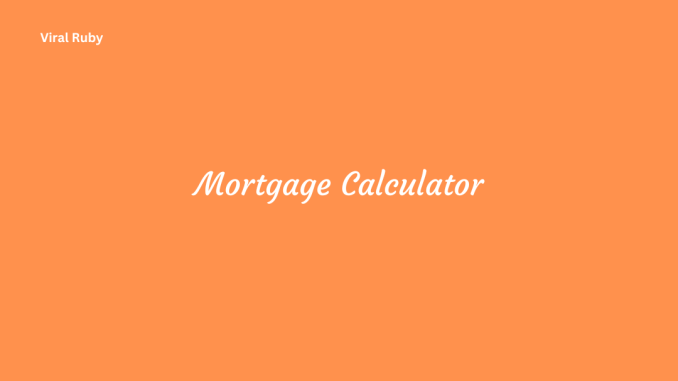
What is Mortgage Calculator?
A mortgage calculator is a tool used to estimate the monthly payments and overall costs associated with a home loan, also known as a mortgage. It takes into account factors such as the loan amount, interest rate, loan term (the number of years over which the loan will be repaid), and sometimes additional costs like property taxes and homeowners insurance.
By inputting these variables into the mortgage calculator, individuals can get an idea of how much their monthly mortgage payments will be. This can be especially useful when shopping for homes and trying to understand the financial implications of different loan options.
Mortgage calculators can provide valuable insights into the affordability of a home and help individuals make informed decisions about their housing choices. Keep in mind that the results provided by a mortgage calculator are estimates, and actual payments may vary due to factors like changes in interest rates, fluctuations in property taxes, and changes in homeowners insurance costs.
Importance of Mortgage Calculator
Financial Planning: For prospective homebuyers, a mortgage calculator is an essential tool for financial planning. It helps them estimate their potential monthly mortgage payments based on factors such as loan amount, interest rate, and loan term. This information allows buyers to assess whether they can comfortably afford a particular property and make informed decisions about their budget.
Budgeting: A mortgage calculator aids in creating a realistic budget. By inputting different loan scenarios, individuals can determine how varying down payments, interest rates, and loan terms impact their monthly payments. This empowers them to make wise choices that align with their financial capacity.
Comparison Shopping: Homebuyers can use a mortgage calculator to compare different mortgage options from various lenders. This helps them identify the most suitable loan terms and interest rates for their needs, potentially saving them a substantial amount of money over the life of the loan.
Refinancing Considerations: For existing homeowners, a mortgage calculator is invaluable when contemplating refinancing options. By inputting current loan details and potential new terms, homeowners can estimate potential savings, determine break-even points, and decide whether refinancing makes financial sense.
Understanding Amortization: Mortgage calculators provide detailed amortization schedules that outline how monthly payments are allocated between principal and interest over the life of the loan. This helps borrowers visualize their progress in building equity and guides them in making extra payments to shorten the loan term.
Forecasting Costs: In addition to principal and interest, mortgage calculators can factor in property taxes, homeowners insurance, and private mortgage insurance (if applicable). This gives a more comprehensive view of the overall homeownership costs and assists in preparing for the financial responsibilities of owning a home.
Empowerment through Information: A mortgage calculator empowers borrowers with information. It helps them understand the financial implications of their decisions and aids in avoiding situations where borrowers might take on more debt than they can comfortably manage.
Quick Assessments: Real estate agents, financial advisors, and mortgage professionals can use mortgage calculators to provide quick assessments to their clients. This enhances the quality of their service and ensures that clients have a clear understanding of the financial aspects of their transactions
Purpose of Mortgage Calculator
Estimate Monthly Payments: One of the primary purposes of a mortgage calculator is to calculate the approximate monthly mortgage payments based on factors such as loan amount, interest rate, and loan term. This helps borrowers understand the financial commitment required for a specific home purchase.
Compare Loan Options: Mortgage calculators enable users to input different loan parameters, such as varying interest rates, loan terms, and down payments. By doing so, individuals can compare different loan options side by side to determine which one best fits their budget and financial goals.
Understand Amortization: Mortgage calculators often provide amortization schedules, which detail how each monthly payment is distributed between principal and interest over the life of the loan. This feature helps borrowers visualize how their loan balance decreases over time and how much interest they will pay.
Assess Affordability: Prospective homebuyers can use mortgage calculators to assess their affordability. By entering their desired monthly payment or total budget, they can determine the maximum loan amount they can comfortably manage.
Explore Down Payment Scenarios: A mortgage calculator allows users to experiment with different down payment amounts. This helps borrowers understand how a larger or smaller down payment affects their monthly payments, total interest paid, and overall loan costs.
Plan for Extra Payments: Some mortgage calculators provide the option to factor in additional payments. This feature allows borrowers to see how making extra payments can shorten the loan term and save on interest costs.
Consider Refinancing: Homeowners can use mortgage calculators to evaluate whether refinancing their current mortgage is financially beneficial. By entering their existing loan details and potential refinance terms, they can estimate potential savings and determine if it’s a wise decision.
Budget for Additional Costs: Many mortgage calculators also include fields for property taxes, homeowners insurance, and other related costs. This comprehensive approach helps borrowers understand the full scope of expenses associated with homeownership.
Educational Tool: Mortgage calculators serve as educational tools, helping borrowers understand how mortgage factors interplay and influence their financial commitment. This knowledge empowers borrowers to navigate the mortgage process more confidently.
Quick and Easy Analysis: Mortgage calculators provide rapid calculations without the need for complex mathematical formulas. Users can quickly evaluate various scenarios and make timely decisions
Future of Mortgage Calculator
Personalization and AI: Mortgage calculators could become more personalized by using artificial intelligence (AI) algorithms to analyze users’ financial situations and preferences. AI-powered calculators could provide tailored recommendations based on individual financial goals and risk tolerance.
Integration with Financial Data: Future mortgage calculators could integrate with users’ financial data, such as income, expenses, and credit history, to provide more accurate affordability assessments and loan options. This could streamline the application process and offer more realistic outcomes.
Real-Time Interest Rate Updates: Mortgage calculators could incorporate real-time interest rate data to provide users with up-to-date estimates. This would give users a more accurate picture of their potential mortgage payments based on current market conditions.
Virtual Reality (VR) Visualization: As technology advances, mortgage calculators might incorporate virtual reality to allow users to virtually explore properties and neighborhoods. This could enhance the homebuying experience and help users make more informed decisions.
Blockchain and Secure Data Handling: With concerns about data security and privacy, future mortgage calculators might leverage blockchain technology to ensure secure handling of sensitive financial information during the calculation process.
Predictive Analytics: Advanced mortgage calculators could utilize predictive analytics to help users anticipate changes in their financial situation over the life of the loan. This could include predicting income fluctuations, interest rate changes, and potential economic shifts.
Gamification for Financial Education: To enhance financial literacy, mortgage calculators could incorporate gamification elements to engage users and educate them about the mortgage process, loan terms, and financial concepts.
Integration with Homebuying Platforms: Mortgage calculators could seamlessly integrate with online real estate platforms and property listings. Users could calculate mortgage estimates directly from property listings, making the home search and financing evaluation more cohesive.
Interactive Communication: Future mortgage calculators might enable direct communication with mortgage experts and advisors through chatbots or real-time messaging. This could provide users with immediate assistance and guidance during the calculation process.
Sustainability and Energy Efficiency Considerations: As environmental awareness grows, mortgage calculators could incorporate factors related to energy-efficient features and sustainability, helping users assess the long-term costs and benefits of eco-friendly homes.
Global Expansion: Mortgage calculators could expand beyond national borders to cater to an international audience, accounting for different mortgage systems, currencies, and regulations.
Accessibility and User-Friendly Design: The future of mortgage calculators could involve improved accessibility features, ensuring that people with disabilities can easily use and benefit from these tools. Additionally, user interfaces could become even more intuitive and user-friendly

Leave a Reply